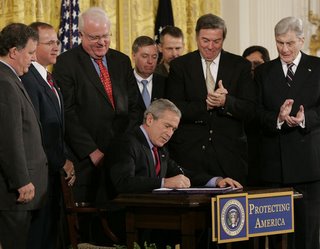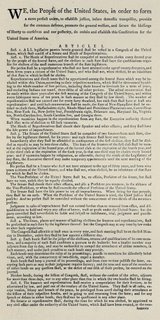Kerry Decries Loss of Habeas Corpus in America!
 On October 17, 2006, President George W. Bush signed new legislation establishing military tribunals and aggressive interrogation techniques.
On October 17, 2006, President George W. Bush signed new legislation establishing military tribunals and aggressive interrogation techniques. As reported:
"The bill on interrogations and trials also would eliminate some rights common in military and civilian courts. For example, the commission would be allowed to consider hearsay evidence so long as a judge determined it was reliable. Hearsay is barred from civilian courts.This legislation allows the President to define torture. It allows evidence obtained under torture to be admitted in legal proceedings. It denies suspects the right to inspect evidence arrayed against them. And it even allows for indefinite detention of "unlawful enemy combatants" who have no recourse in court to sue for their own freedom.
The legislation also says the president can "interpret the meaning and application" of international standards for prisoner treatment, a provision intended to allow him to authorize aggressive interrogation methods that might otherwise be seen as illegal by international courts."
This is a shameful development in America.
 Bruce Ackerman, professor of law and political science at Yale had this to say:
Bruce Ackerman, professor of law and political science at Yale had this to say:"The president walked away with a lot more than most people thought," Ackerman said. He said the bill "further entrenches presidential power" and allows the administration to declare even a U.S. citizen an unlawful combatant subject to indefinite detention. "And it's not only about these prisoners," Ackerman said. "If Congress can strip courts of jurisdiction over cases because it fears their outcome, judicial independence is threatened."As explained by the Jurist, from the University of Pittsburgh School of Law:
"Under the Military Commissions Act [CRS summary], the president is authorized to establish military commissions to try unlawful enemy combatants. The commissions are authorized to sentence defendants to death, and defendants are prevented from invoking the Geneva Conventions [ICRC materials] as a source of rights during commission proceedings. The law contains a highly-controversial provision stripping detainees of the right to file habeas corpus petitions in federal court and also allows hearsay evidence to be admitted during proceedings, so long as the presiding officer determines it to be reliable. The law addresses permissible interrogation methods, making US interrogators subject to only a limited range of "grave breaches" purporting to reflect the requirements of Common Article 3 of the Geneva Conventions, and clarifies [JURIST report] what actions would subject interrogators to liability under the existing federal War Crimes Act."What is Habeus Corpus and why does it matter?
And what did our founding fathers have to say about habeus corpus and illegal detention?
As explained by BBC News,
" Habeas corpus (ad subjiciendum) is Latin for "you may have the body" (subject to examination). It is a writ which requires a person detained by the authorities be brought before a court of law so that the legality of the detention may be examined.Thom Hartmann explains the long history of habeas corpus and its relationship to the Magna Carta better:
The name is taken from the opening words of the writ in medieval times.
Although rarely used nowadays, it can theoretically be demanded by anyone who believes they are unlawfully detained and it is issued by a judge.
It does not determine guilt or innocence, merely whether the person is legally imprisoned. It may also be writ against a private individual detaining another.
If the charge is considered to be valid, the person must submit to trial but if not, the person goes free.
The Habeas Corpus Act passed by Parliament in 1679 guaranteed this right in law, although its origins go back much further, probably to Anglo-Saxon times."
"The modern institution of civil and human rights, and particularly the writ of habeas corpus, began in June of 1215 when King John was forced by the feudal lords to sign the Magna Carta at Runnymede. Although that document mostly protected "freemen" - what were then known as feudal lords or barons, and today known as CEOs and millionaires - rather than the average person, it initiated a series of events that echo to this day.
Two of the most critical parts of the Magna Carta were articles 38 and 39, which established the foundation for what is now known as "habeas corpus" laws (literally, "produce the body" from the Latin - meaning, broadly, "let this person go free"), as well as the Fourth through Eighth Amendments of our Constitution and hundreds of other federal and state due process provisions.
Articles 38 and 39 of the Magna Carta said:
"38 In future no official shall place a man on trial upon his own unsupported statement, without producing credible witnesses to the truth of it.
"39 No free man shall be seized or imprisoned, or stripped of his rights or possessions, or outlawed or exiled, or deprived of his standing in any other way, nor will we proceed with force against him, or send others to do so, except by the lawful judgment of his equals or by the law of the land."
 Thomas Jefferson, in his First Inaugural Address in 1801 stated:
Thomas Jefferson, in his First Inaugural Address in 1801 stated:"Freedom of the person under the protection of the habeas corpus I deem [one of the] essential principles of our government."And Alexander Hamilton in Federalist #84 had this to say:
"It may well be a question, whether these are not, upon the whole, of
equal importance with any which are to be found in the constitution of
this State. The establishment of the writ of habeas corpus, the
prohibition of ex post facto laws, and of TITLES OF NOBILITY, to which
we have no corresponding provision in our Constitution, are perhaps
greater securities to liberty and republicanism than any it contains.
The creation of crimes after the commission of the fact, or, in other
words, the subjecting of men to punishment for things which, when they
were done, were breaches of no law, and the practice of arbitrary
imprisonments, have been, in all ages, the favorite and most formidable
instruments of tyranny. The observations of the judicious Blackstone,[1]
in reference to the latter, are well worthy of recital: "To bereave a
man of life, [says he] or by violence to confiscate his estate, without
accusation or trial, would be so gross and notorious an act of
despotism, as must at once convey the alarm of tyranny throughout the
whole nation; but confinement of the person, by secretly hurrying him to
jail, where his sufferings are unknown or forgotten, is a less public, a
less striking, and therefore a more dangerous engine of arbitrary
government." And as a remedy for this fatal evil he is everywhere
peculiarly emphatical in his encomiums on the habeas corpus act, which
in one place he calls "the BULWARK of the British Constitution."[2]
 But what does the United States Constitution itself say about the Writ of Habeas Corpus?
But what does the United States Constitution itself say about the Writ of Habeas Corpus?In Article 1, Section 9, is stated very clearly:
" The Privilege of the Writ of Habeas Corpus shall not be suspended, unless when in Cases of Rebellion or Invasion the public Safety may require it."I am proud that Senator John Kerry understands the need for the protection of our basic Constitutional freedoms.
He commented last month on the floor of the Senate with these words:
" The Constitution is very specific when it comes to Habeas Corpus. It says “[t]he Privilege of the Writ of Habeas Corpus shall not be suspended, unless when in Cases of Rebellion or Invasion the public Safety may require it.” We are not in a case of rebellion. Nor are we being invaded. Thus, we really don’t have the constitutional power to suspend the Great Writ. And, even if we did, the Constitution allows only for the writ to be suspended. It does not allow the Writ to be permanently taken away. Yet, this is exactly what the bill does. It takes the writ away—forever—from anyone the Administration determines is an “enemy combatant.” Even if they are lawfully on US soil and otherwise entitled to full Constitutional protections and even if they have absolutely no other recourse.But the bill Bush signed is even worse. The President can call any American Citizen an enemy combatant as well whereupon they shall lose many of their Constititutional rights we all hold so dear.
Think of what this means. This bill is giving the administration the power to pick up any non-U.S. citizen inside or outside of the United States, determine in their sole and unreviewable discretion that he is an unlawful combatant, and hold him in jail—be it Guantanamo Bay or a secret CIA prison—indefinitely. Once the Combatant Status Review Tribunal determines that person is an enemy combatant, that is the end of the story—even if the determination is based on evidence that even a military commission would not be allowed to consider because it is so unreliable. That person would never get the chance to challenge his detention; to prove that he is not, in fact, an enemy combatant.
We are not talking about whether detainees can file a habeas suit because they don’t have access to the internet or cable television. We’re talking about something much more fundamental: whether people can be locked up forever without even getting the chance to prove that the government was wrong in detaining them. Allow this to become the policy of the United States and just imagine the difficulty our law enforcement and our government will have arranging the release of an American citizen the next time our citizens are detained in other countries."
It has been said that the Republicans use fear to advance their agenda.
Fear of terrorists, fear of gays, fear of God, and yes fear of Democrats!
But for the first time I must tell you that they are succeeding. I am becoming afraid!
Afraid of an America that turns its back on the most basic of freedoms dating back to the Magna Carta. Fear of a nation that legislates torture, allows rendition to third world countries and endorses secret prisons.
It is time for America to look deep within its own heart to listen to the words of our founding fathers and patriots who gave their lives that we might enjoy the freedom they so longed for.
We cannot sacrifice the Constitution so easily. We cannot give up our freedoms without calling out for change in America! Thank you Senator Kerry for once again having the courage to speak truth to power. I find myself so ashamed of so many in Congress who accept less for us and our children. Our freedoms shall never be taken by forces from without this nation. But their are forces afoot that find expediency more valuable than judicial review. Who find torture acceptable and merely 'aggressive interrogation techniques'. And who do not share out love of what America means!
Come Home America!
The 2006 mid-term elections are near. And 2008 is just around the corner! We have your back John! Keep on coming!
Bob













1 Comments:
Kerry should just own up to his comment... he's got no spine. That's why as a Democrat I couldn't vote for him.
He's pandering to his audience..college students
Post a Comment
<< Home